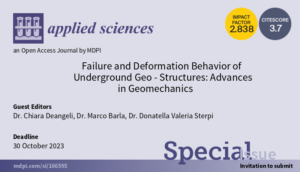Home » Posts tagged 'experimental'
Tag Archives: experimental
FAILURE AND DEFORMATION BEHAVIOR OF UNDERGROUND GEO-STRUCTURES: ADVANCES IN GEOMECHANICS. Special Issue on Applied Sciences
Failure and Deformation Behavior of Underground Geo-structures: Advances in Geomechanics
Special Issue on Applied Sciences, MDPI
Guest Editors: C.Deangeli, M.Barla, D.Sterpi
This Special Issue aims at constructing a channel for sharing knowledge in recent advances in Geomechanics to mitigate adverse events and to address challenges and potential solutions for a sustainable and resilient construction of underground geo-structures. More info on this flyer.
vEGU 2021 – call for abstracts – session NH8.4 on vegetation effects on slope stability and climate-induced geohazards
The NH8.4 session of the EGU General Assembly 2021 (vEGU, April 2021) is entitled ” Vegetation as nature-based solution for mitigating climate induced geo-hazards and associated consequences along slopes and streambanks” and is coordinated by Vittoria Capobianco (Norwegian Geotechnical Institute – NGI), Sabatino Cuomo (University of Salerno), Dominika Krzeminska (Norwegian Institute of Bioeconomy Research – NIBIO) and Anders Solheim (Norwegian Geotechnical Institute – NGI).
Contributions documenting, both through numerical or experimental studies, how vegetation can be beneficial in slope stability and plant-soil-atmosphere interaction in the unsaturated zone are welcome.
Specific topics and research questions related to this session are:
• How the plant-soil-atmosphere interaction affects the unsaturated zone and thus the slope stability?
• Measuring and quantifying the effects of vegetation as NBS for mitigating climate induced geo-hazards and associated consequences at or near instable slopes and along stream banks – case studies at full scale or laboratory scale
• How to ensure interdisciplinary interaction for sustainability and mutual synergies for studies containing vegetation as NBS for mitigating climate induced geo-hazards and associated consequences at or near instable slopes and along stream banks.
Further information about the session can be found here: https://meetingorganizer.copernicus.org/EGU21/session/38969
Interested participants are welcome to submit an abstract within 20 January 2021, which will be followed by an online presentation to be given during the virtual session.
Additional info about abstract submission can be found at: https://egu21.eu/abstracts_and_programme/how_to_submit_an_abstract.html
EGU General Assembly 2021 website: https://www.egu2021.eu/
vEGU 2021 – Sessione sulla geotermia superficiale
Vi segnaliamo, nell’ambito della EGU General Assembly 2021 (vEGU, che si terrà on-line ad aprile 2021), la sessione sulla geotermia superficiale per il condizionamento degli edifici.
Tale sessione (codice ERE 2.6) è intitolata Shallow geothermal systems for heating and cooling: geoscience and engineering approaches ed è coordinata da Giorgia Dalla Santa (Università di Padova), Fleur Loveridge (University of Leeds, UK), Jean De Sauvage (IFSTTAR Université Gustave Eiffel, France), Francesco Cecinato (Università di Milano) e Witold Bogusz (Polish Building Research Institute, Warsaw, Poland). È possibile presentare entro il 20 gennaio 2021 un sommario a cui farà seguito una presentazione online nella sessione virtuale.
Ulteriori informazioni nell’allegato: EGU2021_sessionERE2.6
Sito web EGU General Assembly 2021: https://www.egu2021.eu/
Borsa di dottorato presso University of Strathclyde, Glasgow – UK
Title: Micromechanics of cracking of clay subjected to air drying and/or gas breakthrough
Duration: 3 years
Start date: from 01/10/2020 to 31/12/2020
Stipend: £1270/month
Eligibility: Applications from UK/EU applicants only, First Class Honours (or equivalent)
Where: Department of Civil and Environmental Engineering, University of Strathclyde, Glasgow, Scotland
Supervisors: Dr Matteo Pedrotti (https://www.strath.ac.uk/staff/pedrottimatteomr/) and Professor Alessandro Tarantino (https://www.strath.ac.uk/staff/tarantinoalessandroprof/)
Contact: matteo.pedrotti@strath.ac.uk
Project summary
This 3-year PhD at the University of Strathclyde will focus on investigating the mechanisms at the micro/particle scale underpinning the process of crack formation in clay associated with air drying and/or exposure of the clay interface to gas at high pressure.
The research will mainly be experimentally-based and the PhD candidate will make use of state of the art technologies for the investigation of the clay microstructure including X-Ray Computed Tomography, Environmental Scanning Microscopy, and Mercury Intrusion Porosimetry.
Despite 100 years of research on the macro-mechanical behaviour of clay, we are still largely ignoring underlying mechanisms at the particle scale. Clay micromechanics involves the understanding of the configuration of elements (particles) and the forces controlling the kinematics of such elements. Clay micromechanics (including the evolution of particle configuration in clays when subjected to mechanical loading) has rarely been investigated explicitly and is a young and rapidly growing discipline in the field of soil mechanics.
Besides joining a vibrant geotechnical community at Strathclyde, the candidate will join the International Research Centre For Clay Micromechanics (https://www.irccm.net ) which will provide the opportunity for international collaborations and to spend a period abroad in one of the partner universities (i.e. Chalmers University of Technology – Sweden, University of Twente – The Netherlands, Université Grenoble Alpes – France, University of Brasilia – Brazil, Politecnico di Bari – Italy, Technical University of Denmark – Denmark) .
Industrial contacts will be mainly focused, but not only, towards the Carbon Storage and Sequestration sector.
2 experimentalist positions at Université de Pau et des Pays de l’Adour (France)
 Two new experimentalist positions are available in the Geomechanics and Porous Media research group at Université de Pau et des Pays de l’Adour, Basque Coast Campus, Anglet, France:
Two new experimentalist positions are available in the Geomechanics and Porous Media research group at Université de Pau et des Pays de l’Adour, Basque Coast Campus, Anglet, France:
Research Engineer Assistant in experimental porous media. Starting date: September 1st, 2020 (16 months). Details may be found at:
https://perso.crans.org/gregoire/positions@G2MP/Offre-AI-G2MP.pdf
Research Engineer in experimental porous media. Starting date: September 1st, 2020 (16 months). Details may be found at:
https://perso.crans.org/gregoire/positions@G2MP/Offre-IR-Newpores.pdf
Deadline for applications: June 26, 2020
EGU General Assembly 2020 – Sessione sulla geotermia superficiale
Vi segnaliamo, nell’ambito della EGU General Assembly 2020 (Vienna, 3-8 maggio 2020), la sessione sulla geotermia superficiale per il condizionamento degli edifici.
La sessione ERE 2.8, intitolata Shallow geothermal systems for building heating and cooling: geoscience and engineering approaches, è coordinata da Giorgia Dalla Santa (Università di Padova), Witold Bogusz (Polish Building Research Institute, Warsaw), Francesco Cecinato (Università di Milano), Fleur Loveridge (University of Leeds) e Donatella Sterpi (Politecnico di Milano). È possibile presentare entro il 15 gennaio 2020 un sommario a cui farà seguito una presentazione orale o tramite poster, da tenere nell’ambito della sessione durante il convegno.
The session welcomes contributions about shallow geothermal energy applications, including traditional closed- and open-loop borehole heat exchangers as well as so-called energy geostructures (e.g. thermo-active foundations, walls, tunnels).
Different types of analysis and approaches are relevant to this session, spanning from the evaluation of ground thermal properties to the mapping of shallow geothermal potential, from energy storage and district heating to sustainability issues and consequences of the geothermal energy use, from the design of new heat exchangers and installation techniques to the energy and thermo-(hydro-) mechanical performance of energy geostructures. Contributions based on experimental, analytical and numerical modelling are welcome as well as interventions about legislative aspects.
Ulteriori informazioni sulla sezione alla pagina: https://meetingorganizer.copernicus.org/EGU2020/session/34720
Sito web EGU General Assembly 2020: https://www.egu2020.eu/
Opportunity for PhD studies on Unsaturated Geomaterials and Contaminant Transport at Monash University (Melbourne)
Three scholarships are available for PhD studies commencing in 2019. The scholarships will provide support for three years on a full-time basis for a research project leading to a PhD.
Project 1: the project aims at developing an experimentally validated theory of the behaviour of geosynthetic clay liners (GCLs) under high temperatures and salt gradients that will lead to a significant improvement in the understanding of their hydraulic behaviour. The PhD will focus on the evaluation of temperature effects, wet/dry cycles salt gradients and stress changes on the water retention curves (WRCs) of geosynthetic clay liners.
Project 2 (2 scholarships): the project will focus on contaminant transport through lining systems. Particular emphasis will be given to chemical compatibility issues between a suite of emerging contaminants (PFAS, etc.) and soil and geosynthetic liners. This project aims at providing practitioners with better tools to estimate the design life of hydraulic barriers systems.
Applicants should have an Honours 1 or First Class Honours Degree in Engineering or Science and an interest in analytical/numerical and experimental research. The scholarship value is A$28,500 per annum, with the possibility of a top-up depending on academic standing and/or experience. The potential for further earning is also possible through tutoring.
For further information, contact Prof. Malek Bouazza, at malek.bouazza@monash.edu. Applications including a curriculum vitae, a copy of academic transcript, evidence of English-language proficiency (international applicants only) names and contact details of at least two academic referees should be sent to the above email address.
Research positions at Imperial College (UK), EPFL (Zwitzerland), Newcastle University (UK)
Applications are invited for a one year full-time researcher based in the Department of Civil and Environmental Engineering at Imperial College London in the area of discrete element modelling and computational fluid dynamics. The successful applicant will join the Geotechnics research group as a member of research staff and will conduct research on an EPSRC funded project entitled “Particle-scale investigation of seepage induced geotechnical instability”. The work will be conducted under the supervision of Professor Catherine O’Sullivan.
The start date for this research post is July 1 2019.
More information at: https://www.imperial.ac.uk/jobs/description/ENG00849/research-assistantassociate/
Postdoctoral position in Energy Geostructures field, Laboratory of Soil Mechanics (LMS), EPF Lausanne.
The position, funded by Swiss National Science Foundation (SNSF), aims at providing fundamental information on the mechanisms governing the cyclic thermo-mechanical behaviour of energy geostructures by analyzing multiphysical processes occurring within the soil, soil-structure interface and along energy geostructures through an experimental, theoretical, and numerical approach.
The position is now open and will start on August 1st 2019 or upon agreement.
More information in: Postdoc-Position-LMS-EPFL-2
Post of Research Assistant/Research Associate in the School of Engineering at Newcastle University in the area of computational geotechnics. The successful applicant will carry out high-quality research on infrastructure embankments and the impacts of climate change. This project is part ACHILLES consortium which comprises the Universities of Newcastle, Durham, Loughborough, Southampton, Bath and Leeds and the British Geological Survey.
The closing date for applications is 26th May 2019.
More information at: https://www.jobs.ac.uk/job/BRV878/research-assistant-associate-d174412r2
Borse di dottorato presso University of Strathclyde, Glasgow – UK (scadenza 25/10/2018)
Il Department of Civil and Environmental Engineering dell’University of Strathclyde (Glasgow, Scotland, UK) offre due posizioni di dottorato sui seguenti temi:
1) Clay micromechanics: from experimental evidence at the nano/micro scale to particle-scale modelling via Discrete Element Method
2) Engineering vegetation to stabilise geotechnical structures: developing open-air portable laboratory to design vegetation-based remedial measures
Durata: 3 anni
Borsa: £1230/mese
Scadenza della domanda: 25 ottobre 2018
La data di inizio è prevista tra gennaio e febbraio 2019. Si richiede un voto di laurea non inferiore a 104/110 (possibilmente 110/110). Per ulteriori informazioni, contattare il Prof. Alessandro Tarantino (alessandro.tarantino@strath.ac.uk)






